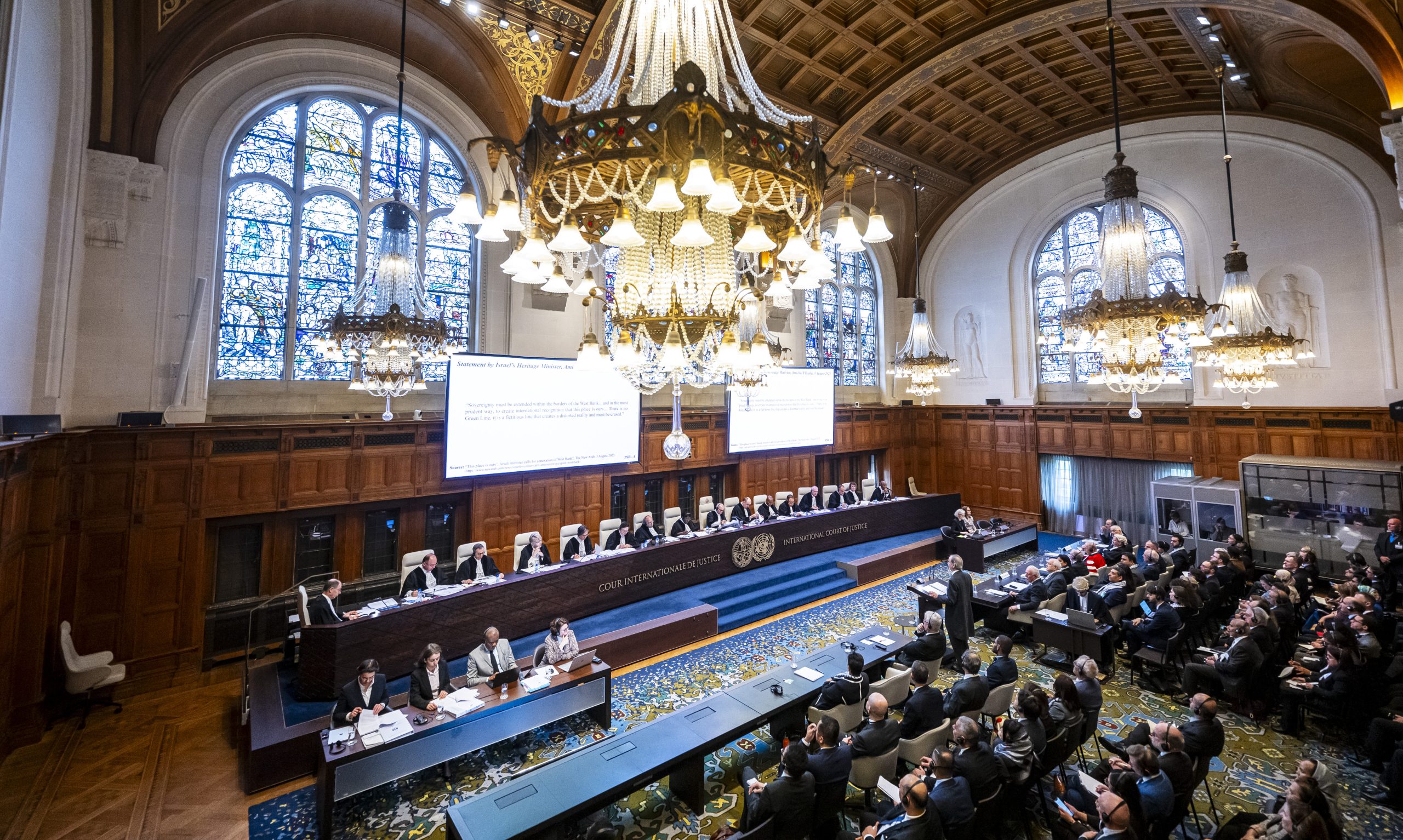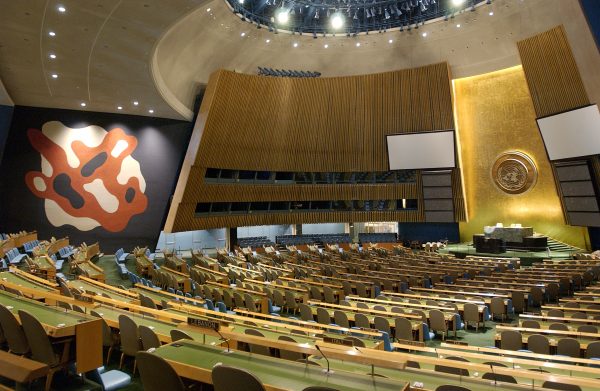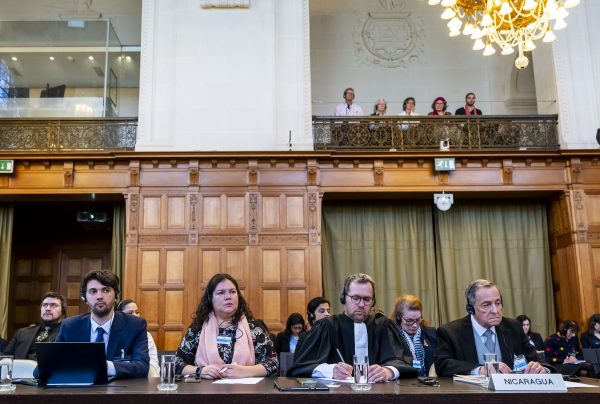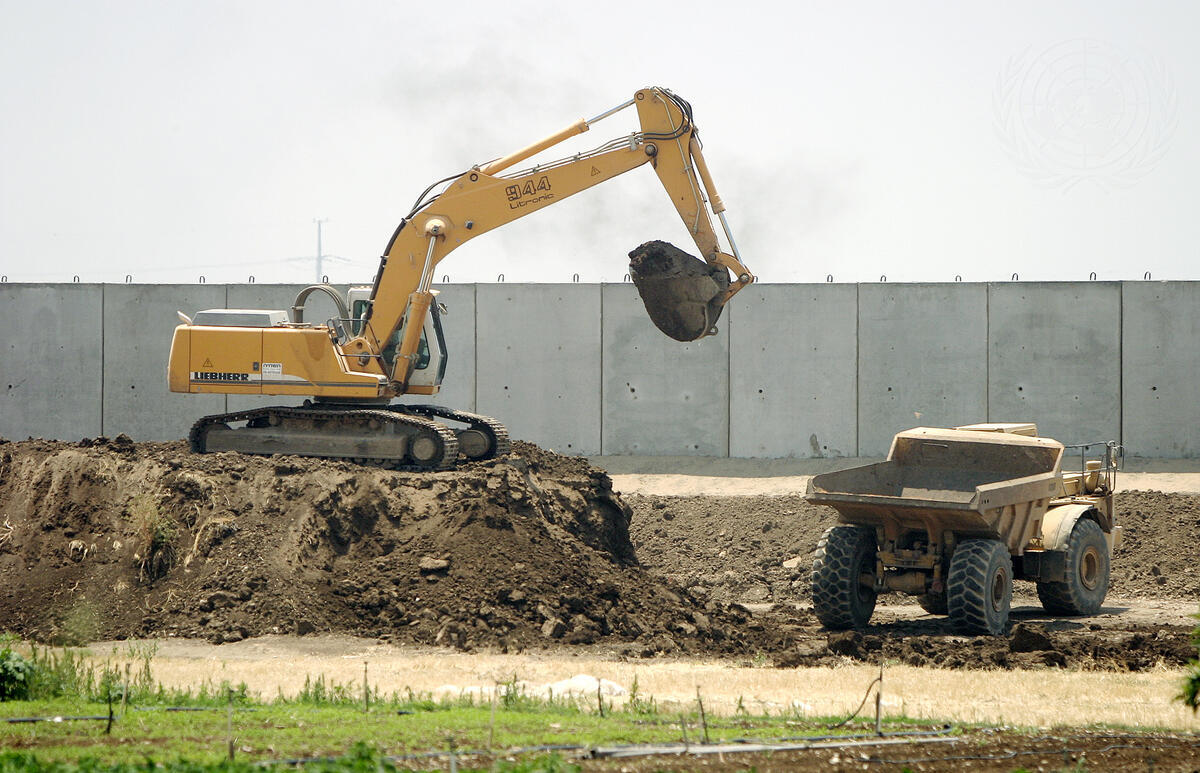
The seat of the Court - the Peace Palace - in The Hague, Netherlands

View of the courtroom of the International Court of Justice (ICJ), principal judicial organ of the UN, while holding public hearings on the request for an advisory opinion in respect of the Legal Consequences arising from the Policies and Practices of Israel in the Occupied Palestinian Territory, including East Jerusalem, from Monday 19 to Monday 26 February 2024, at the Peace Palace in The Hague, the seat of the Court.
The International Court of Justice (ICJ) has played a pivotal role in addressing the complex and contentious issues surrounding the question of Palestine throughout history. As the principal judicial organ of the United Nations, the ICJ has been involved in several key cases that touch on the legality of actions and policies affecting the occupied Palestinian territory.
Throughout its history, the ICJ’s involvement in the Palestinian question has served to affirm and clarify the application of international law, contributing to the global discourse on rights, sovereignty, and legal responsibilities in conflict situations.
Below are the cases and selected documents.

A general view of the General Assembly Hall. UN Photo/Sophia Paris
The International Court of Justice (ICJ) case titled “Legal Consequences arising from the Policies and Practices of Israel in the Occupied Palestinian Territory, including East Jerusalem” was initiated by a request from the United Nations General Assembly under Resolution A/RES/77/247. This resolution, passed on December 30, 2022, stated the following:
18. [General Assembly] Decides, in accordance with Article 96 of the Charter of the United Nations, to request the International Court of Justice, pursuant to Article 65 of the Statute of the Court, to render an advisory opinion on the following questions, considering the rules and principles of international law, including the Charter of the United Nations, international humanitarian law, international human rights law, relevant resolutions of the Security Council, the General Assembly and the Human Rights Council, and the advisory opinion of the Court of 9 July 2004:
(a) What are the legal consequences arising from the ongoing violation by Israel of the right of the Palestinian people to self-determination, from its prolonged occupation, settlement and annexation of the Palestinian territory occupied since 1967, including measures aimed at altering the demographic composition, character and status of the Holy City of Jerusalem, and from its adoption of related discriminatory legislation and measures?
(b) How do the policies and practices of Israel referred to in paragraph 18 (a) above affect the legal status of the occupation, and what are the legal consequences that arise for all States and the United Nations from this status?
The hearings, which spanned the period from February 19 to 26, 2024, saw a comprehensive presentation of arguments from various states and organizations regarding the legality of Israel’s occupation under international law.
The International Court of Justice (ICJ) issued an advisory opinion on July 19, 2024, stating that Israel’s continued presence in the Occupied Palestinian Territory is unlawful. The Court emphasized that Israel is under an obligation to bring to an end its unlawful presence in the Occupied Palestinian Territory as rapidly as possible, cease all new settlement activities, evacuate settlers, and make reparations for damages caused. It further stated that all states and international organizations, including the United Nations, are obligated not to recognize the legality of Israel’s continued presence in the OPT and not to aid in maintaining this situation. The UN, particularly the General Assembly and Security Council, should consider the modalities and actions to expedite the end of Israel’s unlawful presence in the territory.
Below are selected documents related to the case:
- ICJ’s Advisory Opinion of 19 July 2024
- Summary of the ICJ Order of 19 July 2024
- The ICJ Press Release – Court gives its Advisory Opinion and responds to the questions posed by the General Assembly
- Israeli Practices Affecting the Human rights of the Palestinian People in the Occupied Palestinian Territory, including East Jerusalem – GA Resolution (A/RES/77/247)
- Fifth Committee Approves Budget that Includes Funds for ICJ Advisory Opinion on Israel-Palestine Issue – Press Release (GA/AB/4414) (Excerpts)
- ICJ Authorizes the African Union to Participate in Proceedings on Legal Consequences Arising From the Policies and Practices of Israel in OPT – Press Release
- ICJ Organizes Proceedings on Case Involving Policies and Practices of Israel in OPT – Press Release
- Conclusion of the public hearings held from 19 to 26 February 2024 – Press Release
- Verbatim Records – Public sitting on the case – (CR 2024/4), (CR 2024/5), (CR 2024/6), (CR 2024/7), (CR 2024/8), (CR 2024/9), (CR 2024/10), (CR 2024/11), (CR 2024/12), (CR 2024/13) and (CR 2024/14) [Updated]
- Written statement of Bangladesh
- Written statement of Canada
- Written statement of Luxembourg
- Written statement of Namibia
- Written statement of Türkiye
- Written statement of the State of Israel
- Written statement of the State of Palestine

View of the ICJ courtroom on 16 May 2024 during the Public hearings on the request for the indication/modification of provisional measures submitted by South Africa (South Africa v. Israel)
On 29 December 2023, South Africa initiated legal proceedings against Israel at the International Court of Justice (ICJ), alleging violations of the Genocide Convention related to the treatment of Palestinians in Gaza. The application sought provisional measures to prevent further harm under the Convention and ensure Israel’s compliance with its obligations to prevent and punish genocide. Over the following months, the ICJ addressed multiple requests from South Africa for provisional measures, issuing orders to safeguard the rights under consideration. Additionally, several countries, including Nicaragua, Colombia, Libya, Mexico, Spain, and the State of Palestine, filed for intervention in the case, highlighting its international significance. Public hearings and subsequent court orders throughout early to mid-2024 reflect the ongoing judicial process and the global concern regarding the allegations of genocide in Gaza.
Below are the case-related documents:
- South Africa institutes proceedings against Israel and requests the International Court of Justice to indicate provisional measures – ICJ Press Release
- Application instituting proceedings and Request for the indication of provisional measures (un.org)
- Court Order of 26 January 2024 (the page also contains declarations and dissenting opinions of the Judges)
- Urgent Request for additional measures under Article 75(1) of the rules of Court of the International Court of Justice
- Decision of the Court on South Africa’s request for additional provisional measures – ICJ Press Release
- The Republic of South Africa submits an urgent request for the indication of additional provisional measures and the modification of the Court’s prior provisional measures Order and decision (South Africa v. Israel) – ICJ Press Release and Application, 6 March 2024
- Additional provisional measures. ICJ Order of 28 March 2024
- South Africa submits an urgent request for the indication of additional provisional measures and the modification of previous provisional measures – 10 May 2024
- Court Order of 24 May 2024
- ICJ: Application for permission to intervene submitted by Nicaragua in the case concerning South Africa v. Israel
- Colombia files a declaration of intervention in the proceedings under Article 63 of the Statute
- Libya files a declaration of intervention in the proceedings under Article 63 of the Statute
- Mexico files a declaration of intervention in the proceedings under Article 63 of the Statute
- Palestine files a declaration recognizing the competence of the International Court of Justice
- Spain files a declaration of intervention in the proceedings under Article 63 of the Court’s Statute

Members of the Delegation of Nicaragua during the reading of the Order of the Court on the request for the indication of provisional measures submitted by Nicaragua vs Germany, 30 April 2024
The case “Alleged Breaches of Certain International Obligations in respect of the Occupied Palestinian Territory (Nicaragua v. Germany)” involves Nicaragua instituting proceedings against Germany at the International Court of Justice (ICJ). Nicaragua’s allegations focus on claims that Germany has failed to meet its international obligations regarding the situation in the Occupied Palestinian Territory, particularly in relation to arms exports and other forms of support to Israel.
Timeline:
- March 1, 2024: Nicaragua initiates proceedings against Germany, alleging breaches of international obligations regarding the situation in the Occupied Palestinian Territory. Nicaragua requests the court to indicate provisional measures.
- April 8-9, 2024: Public hearings were held at the ICJ to discuss Nicaragua’s request for provisional measures (Verbatim Records)
- April 30, 2024: The ICJ delivers its order regarding the provisional measures requested by Nicaragua.
The case “Relocation of the United States Embassy to Jerusalem (Palestine v. United States of America)” was initiated by Palestine against the United States at the International Court of Justice (ICJ) on September 28, 2018. The case arose in response to the U.S. decision to move its embassy from Tel Aviv to Jerusalem, a move Palestine contends violates international law, specifically the rules regarding diplomatic relations and the status of Jerusalem.
Below are the case-related documents:
- Application Instituting Proceedings in the ICJ – State of Palestine v. US
- State of Palestine Institutes Proceedings Against US – International Court of Justice Press Release
- President of the ICJ – Palestine Instituted Proceedings on Alleged Violations of the Vienna Convention on Diplomatic Relations of 18 April 1961 (Excerpts)
- ICJ Order of 15 November 2018
- ICJ to Consider Jurisdiction, Admissibility Issues in Case Involving Relocation of US Embassy to Jerusalem – Press Release -30 November 2018

View of Construction of Separation Wall on West Bank, 2003 UN Photo/Stephenie Hollyman
In December 2003, the UN General Assembly requested an advisory opinion from the International Court of Justice (ICJ) regarding the legal consequences of Israel’s construction of a wall in the Occupied Palestinian Territory. The ICJ received numerous written statements and held oral hearings in early 2004, with participation from various states and organizations. On July 9, 2004, the ICJ delivered its advisory opinion, finding that the construction of the wall was contrary to international law and violated both humanitarian and human rights laws.
The ICJ determined that the wall’s construction breached the Fourth Geneva Convention, as it involved the illegal annexation of Palestinian land and severely impeded the Palestinian people’s right to self-determination. The Court noted that the wall’s route, which included many Israeli settlements, altered the demographic composition of the occupied territories and created a de facto annexation. Furthermore, the Court rejected Israel’s justification of self-defense, stating that the specific route of the wall was not necessary for security purposes.
The Court concluded that Israel must cease the construction of the wall, dismantle the sections within the Occupied Palestinian Territory, and make reparations for the damages caused. It also called upon other states not to recognize the illegal situation and to ensure Israel’s compliance with international humanitarian law. The ICJ emphasized the need for a negotiated solution based on international law to resolve the Israeli-Palestinian conflict.
Related documents:
- Resolution ES-10/14 adopted by the General Assembly requesting ICJ Advisory Opinion on Legal Consequences of the Construction of a Wall in the Occupied Palestinian Territory
- ICJ Advisory Opinion on the Legal Consequences of the Construction of a Wall in the OPT – ICJ document
- Separate opinion of Judge Koroma
- Separate opinion of Judge Owada
- Separate opinion of Judge Higgins
- Separate opinion of Judge Al-Khasawneh
- Separate opinion of Judge Elaraby
- Separate opinion of Judge Kooijmans
- ICJ advisory opinion summary/ Separation wall – Summary
- ICJ advisory opinion to General Assembly separation wall – SecGen statement – Press release
- Declaration of Judge Buergenthal
- Registry of damages caused by the wall – a legal and institutional framework – SecGen letter to GA President

